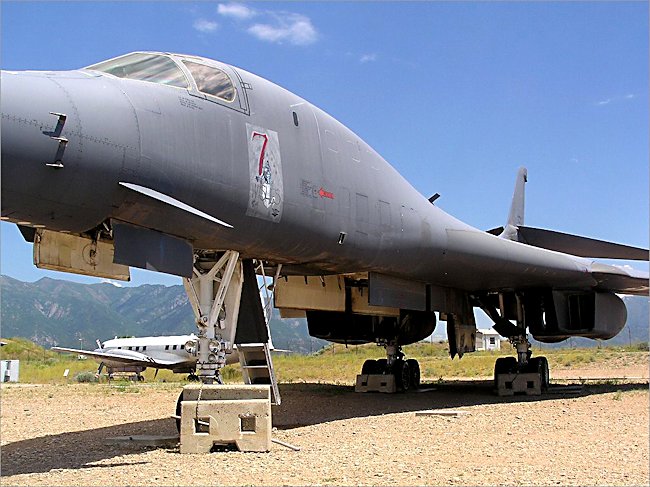Rockwell B1 Lancer Bomber
During the Cold War in the mid 1950s the US had prepared to fight a nuclear war with similar tactics to those used in World War Two. Send a bomber over enemy territory at high altitude and release the bombs. The United States of America's nuclear strategic airpower provided a nuclear umbrella for America and its allies. The idea behind the build up of a nuclear force was to deter war and resolve conflicts on terms favourable to the United States as they were the strongest side.
In 1958 high altitude covert U-2 spy planes reported being fired upon by Russian surface-to-air missiles SAMs and that they got uncomfortably close to the U-2s operating altitude. This prompted SAC to revise tactics for the B-52 Bombers and issue design specifications for a new bomber that could penetration enemy air space in all-weathers at below 500 feet and survive. Inter-continental Ballistic Missiles ICBM took over the first response Nuclear strike option.

The USAF Boeing B1-A Lancer first flew in 1974. It was initially intended to replace the Boeing B-52 which had been in operational service since 1950's. B-1A production was cancelled by the President on June 30, 1977 but in January 1982 the designs were upgraded and production restarted of the new bomber the B-1B. It had a low-radar cross-section to help it avoid detection. It also has defensive tools like electronic jamming equipment, infrared countermeasures, radar location and warning systems as part of its integrated aircraft defence system.
The B-1 can travel at high speeds at low level for longer distances because of its swing-wing design and turbofan engines. For a short take off and a fast base-escape when airfields are under attack the B1 Lancer has its wing sweep at the full-forward position. The B-52 has to use a much longer runway to get airborne. When it is airborne the wings are put in the backward sweep position for maximum cruise distance or high-speed penetration.
The B1-B upgraded variant had better systems for conventional attack, survivability and availability. The B1B Lancer bombers saw service in the two gulf wars and Kosovo. It can carry up to 84 Mark 82 conventional 500-pounds bombs, or 30 CBU-87/89/97, or 24 JDAMS. It can also be reconfigured for wide range of nuclear bombs. The B-1 could carry twice the payload of the much larger B-52G bomber. It has a top speed of Mach 1.2 at sea level